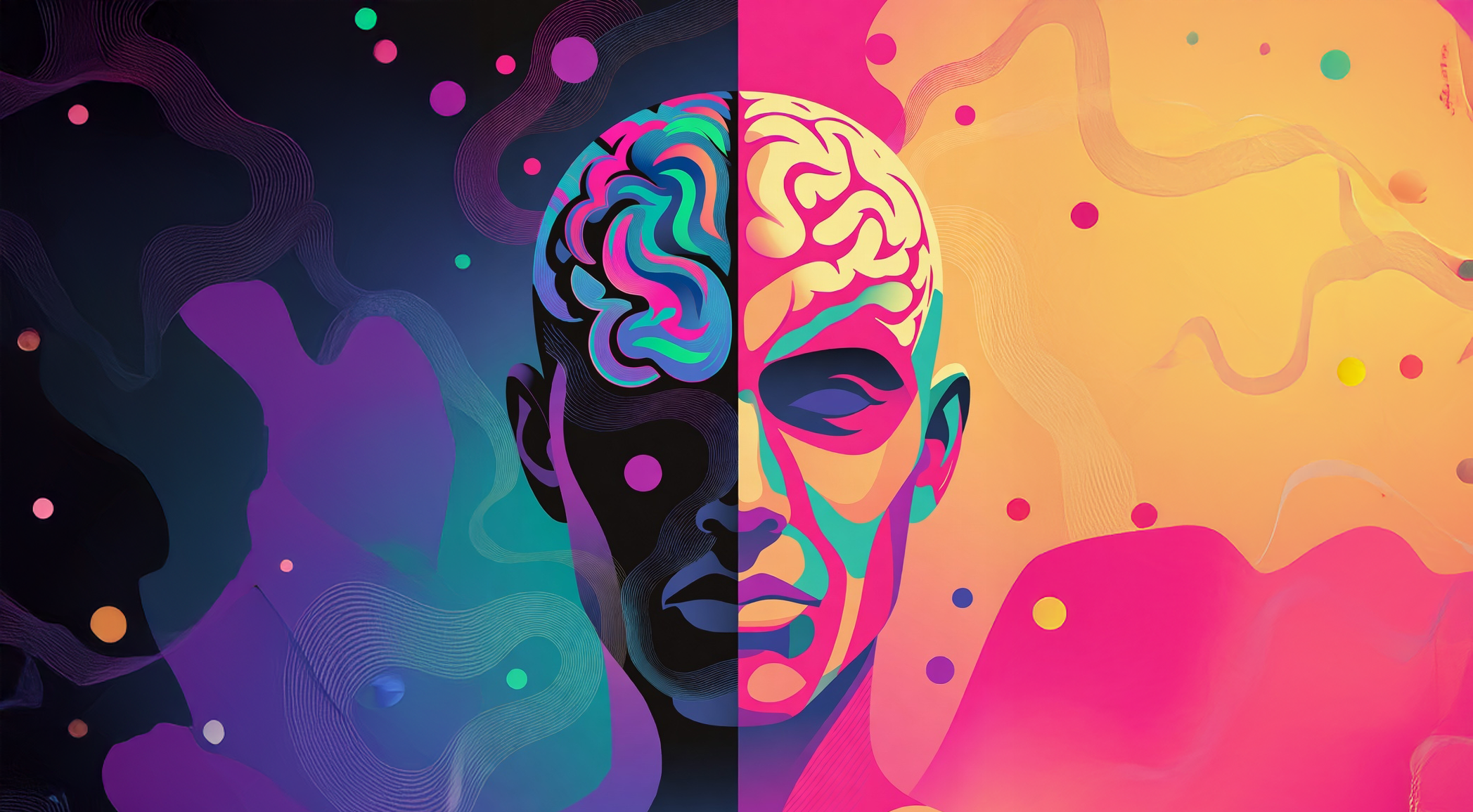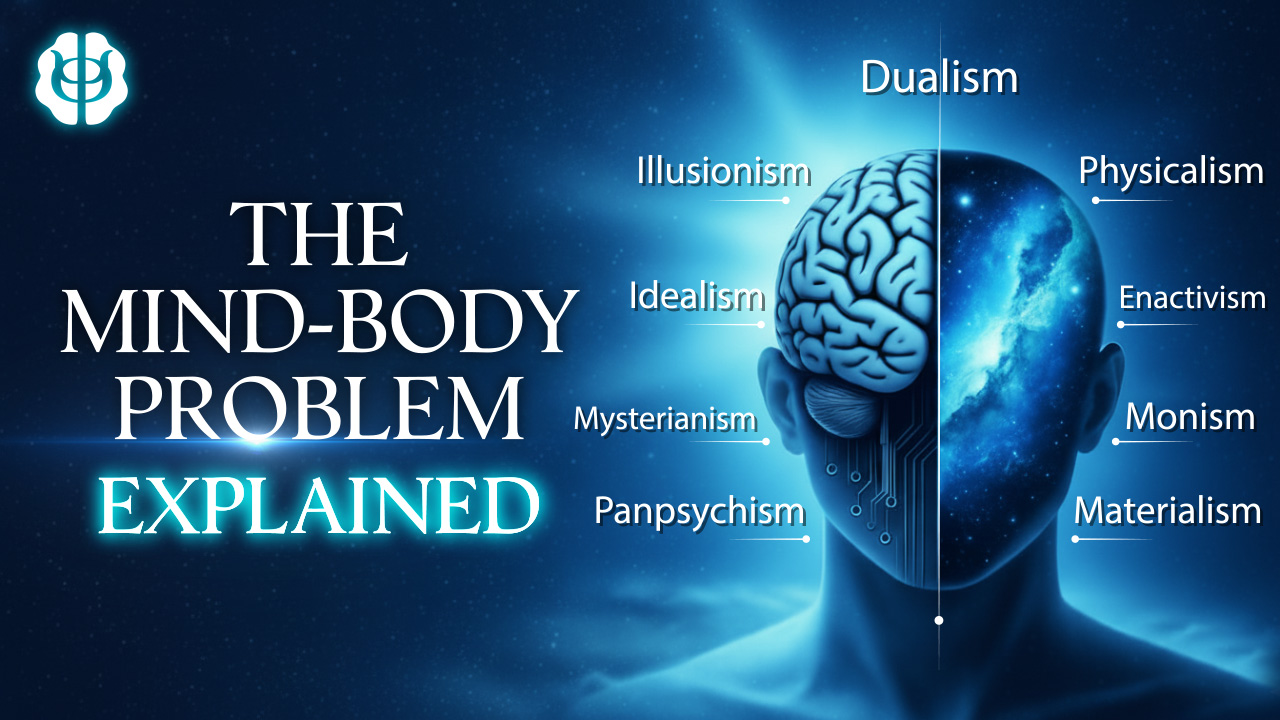Why the Mind-Body Problem Matters: Exploring the Implications for Free Will, Ethics, and Meaning

The mind-body problem, a philosophical puzzle that has intrigued thinkers for centuries, asks a fundamental question: how do our subjective experiences, our thoughts, feelings, and consciousness, relate to the physical matter of our brains and bodies? It's easy to think of this as an abstract, academic debate, but as we explore in this blog post, the implications of how we answer this question are far-reaching, touching upon our understanding of free will, ethics, and the very meaning of life. This post expands on the ideas discussed in our latest podcast episode, What is the Mind-Body Problem? | Mind-Body Solution, where we introduced the core concepts and historical perspectives surrounding this enduring philosophical challenge. In this episode, we explored the ancient roots of the problem, Descartes' groundbreaking contributions, and how modern science and philosophy continue to grapple with the mystery of consciousness. So, whether you're a seasoned philosopher or simply curious about the nature of reality, join us as we delve into why the mind-body problem truly matters.
Introduction: The Enduring Relevance of the Mind-Body Problem
The mind-body problem isn't just an intellectual exercise; it's a fundamental question about who we are and our place in the universe. Our intuitive sense is that we are conscious beings, capable of thought, feeling, and making choices. But how can these subjective experiences arise from the objective matter of our brains? This question has profound implications for how we understand ourselves, our relationships with others, and the world around us. If our minds are simply the result of physical processes, does that mean free will is an illusion? Does it affect our moral responsibility if our actions are determined by the laws of physics? And what does it mean for our sense of purpose and meaning in life if consciousness is nothing more than a byproduct of brain activity?
Throughout history, philosophers, scientists, and theologians have grappled with the mind-body problem, offering a diverse range of solutions, from dualism, which posits that the mind and body are separate substances, to materialism, which argues that everything, including the mind, is ultimately physical. Each of these perspectives has its own set of implications, shaping our understanding of consciousness, free will, ethics, and meaning. In this blog post, we will explore the key aspects of the mind-body problem and its impact on these fundamental aspects of human existence.
Recap: What is the Mind-Body Problem?
At its core, the mind-body problem is about understanding the relationship between our subjective experiences (our thoughts, feelings, sensations, and consciousness) and the objective, physical world, particularly our brains. It asks how something immaterial like a thought or a feeling can arise from something material like neurons firing in the brain. There are several key aspects to this problem:
- The Nature of Consciousness: What is it like to be conscious? What does it mean to have subjective experiences, also known as "qualia"? Can these experiences be reduced to purely physical descriptions? This is often referred to as the "hard problem of consciousness."
- The Problem of Interaction: If the mind and body are distinct, how do they interact? How can a non-physical mind influence a physical body, and vice versa? This is a major challenge for dualistic views.
- The Problem of Causation: How do mental states cause physical actions? If our thoughts are simply byproducts of brain activity, does that mean our actions are predetermined by physical laws?
Historically, the mind-body problem has been approached from various perspectives, including:
- Dualism: The belief that the mind and body are distinct substances. Substance dualism, most famously advocated by René Descartes, argues that the mind is a non-physical entity that interacts with the body. Property dualism suggests that while there is only one substance (the body), it possesses both physical and mental properties.
- Materialism (Physicalism): The view that everything, including the mind, is ultimately physical. There are several variations of materialism, including:
- Reductive Materialism: Mental states can be reduced to physical states.
- Eliminative Materialism: Mental states do not exist, and our common-sense understanding of the mind is fundamentally flawed.
- Functionalism: Mental states are defined by their causal roles, or functions, rather than their intrinsic properties.
- Idealism: The view that reality is fundamentally mental or spiritual.
- Neutral Monism: The belief that reality is composed of a single substance that is neither purely physical nor purely mental.
Each of these perspectives offers a different way of understanding the relationship between mind and body, and each has its own strengths and weaknesses.
The Mind-Body Problem and Free Will: Are We Really in Control?
The mind-body problem has significant implications for our understanding of free will. If our minds are simply the result of physical processes in the brain, then our thoughts, decisions, and actions may be predetermined by the laws of physics. This raises the question: are we truly free to choose our actions, or are we simply puppets of our physical makeup?
Determinism is the view that all events, including human actions, are causally determined by prior events. If determinism is true, then free will may be an illusion. Our sense of making choices may simply be a subjective experience that masks the underlying physical processes that are actually driving our behavior.
However, there are alternative perspectives on free will that attempt to reconcile it with the physical world:
- Compatibilism (Soft Determinism): The view that free will is compatible with determinism. Compatibilists argue that we are free when we act according to our desires, even if those desires are ultimately determined by prior causes.
- Libertarianism: The belief that we have genuine freedom to choose between different courses of action. Libertarians typically reject determinism and argue that our choices are not fully determined by prior events.
The debate over free will and determinism is closely linked to the mind-body problem. If we adopt a materialistic view of the mind, it becomes more difficult to defend libertarian free will. If our minds are simply physical systems, then it seems likely that our actions are ultimately determined by physical laws. However, if we adopt a dualistic view, it may be easier to argue that the mind has the power to influence the body and make free choices.
Ethical Implications: Moral Responsibility in a Material World
Our understanding of free will has profound implications for our ethical and legal systems. If we are not truly free to choose our actions, then it becomes difficult to hold people morally responsible for their behavior. If a person's actions are determined by factors beyond their control, can we justly punish or reward them?
Traditionally, our ethical systems are based on the assumption that individuals are responsible for their actions and can be held accountable for their choices. We believe that people deserve praise for good deeds and blame for bad deeds because they freely chose to act in those ways. However, if free will is an illusion, then this assumption may be called into question.
Some argue that even if determinism is true, we can still hold people morally responsible for their actions. They suggest that punishment and reward can be seen as ways to shape behavior and deter future wrongdoing, even if individuals are not ultimately responsible for their actions. This is often referred to as a consequentialist approach to ethics, where the focus is on the consequences of our actions rather than the intentions behind them.
Others argue that if free will is an illusion, then our ethical systems need to be fundamentally rethought. They suggest that we should focus on addressing the underlying causes of harmful behavior rather than simply punishing individuals for their actions. This might involve addressing social inequalities, improving education, and providing mental health care.
The mind-body problem, therefore, challenges us to reconsider the foundations of our ethical and legal systems and to explore alternative ways of thinking about moral responsibility.
The Search for Meaning: Consciousness and Purpose
The mind-body problem also raises questions about the meaning and purpose of life. If consciousness is simply a byproduct of brain activity, does that mean our lives are ultimately meaningless? If we are just complex machines, what is the point of our existence?
For many people, the belief in a soul or a spiritual dimension provides a sense of meaning and purpose. If the mind is something more than just the brain, then it may be possible to believe in an afterlife or a higher power. However, if we adopt a materialistic view of the mind, it becomes more difficult to maintain these beliefs.
Nevertheless, even if consciousness is simply a product of the brain, it does not necessarily follow that life is meaningless. Many people find meaning in their relationships, their work, their hobbies, and their contributions to society. They believe that we can create our own meaning and purpose, even in the absence of a divine plan.
Furthermore, the very fact that we are conscious beings capable of reflection and self-awareness can be seen as a source of meaning. We have the ability to appreciate the beauty of the world, to experience love and joy, and to strive for knowledge and understanding. These experiences, in and of themselves, can provide a sense of purpose and fulfillment.
The mind-body problem, therefore, encourages us to reflect on our values, our goals, and our place in the universe. It challenges us to find meaning and purpose in a world that may not have any inherent meaning.
Exploring Different Solutions and Their Consequences
The various solutions to the mind-body problem each have their own unique consequences for our understanding of free will, ethics, and meaning. Here's a brief overview:
- Dualism:
- Consequences: Offers potential support for free will and the existence of a soul, allowing for traditional ethical systems and the possibility of an afterlife.
- Challenges: Faces the problem of interaction – how does a non-physical mind interact with a physical body?
- Materialism:
- Consequences: Challenges traditional notions of free will and moral responsibility. Requires rethinking ethical systems and potentially finding meaning in a purely physical world.
- Challenges: Struggles to explain subjective experience (qualia) and the nature of consciousness.
- Idealism:
- Consequences: Places consciousness at the center of reality, potentially providing a strong foundation for meaning and purpose.
- Challenges: Conflicts with our everyday experience of a physical world that exists independently of our minds.
Ultimately, the choice of which solution to adopt is a personal one, based on one's own beliefs, values, and experiences. However, it is important to be aware of the consequences of each choice and to consider the implications for our understanding of ourselves and the world around us.
The Mind-Body Problem in the Age of Neuroscience and AI
The mind-body problem is not just a philosophical puzzle; it is also a scientific challenge. Advances in neuroscience are providing us with increasingly detailed knowledge of the brain and its functions. As we learn more about how the brain works, we may be able to gain new insights into the relationship between mind and body.
Neuroscience is helping us to understand the neural correlates of consciousness – the specific brain activity that is associated with different conscious experiences. By studying these neural correlates, we may be able to develop a better understanding of the physical basis of consciousness.
Artificial intelligence (AI) is also playing a role in the mind-body problem. As we create increasingly sophisticated AI systems, we may begin to ask whether these systems are conscious. If we can build a machine that exhibits all the behaviors associated with consciousness, would we be justified in saying that it is truly conscious? This question forces us to confront our own assumptions about the nature of consciousness and the criteria for determining whether something is conscious.
The development of AI also raises ethical questions about the treatment of conscious machines. If we create machines that are capable of experiencing pain and suffering, would we have a moral obligation to treat them humanely? These are complex questions that require careful consideration.
The mind-body problem, therefore, is not just an abstract philosophical debate; it is a pressing issue with practical implications for science, technology, and ethics.
Why This Matters: A Call to Philosophical Exploration
The mind-body problem may seem like an esoteric topic, but it touches upon some of the most fundamental questions about human existence. It challenges us to think critically about the nature of consciousness, free will, ethics, and meaning. By engaging with this problem, we can gain a deeper understanding of ourselves and our place in the universe.
Whether you are a philosopher, a scientist, a student, or simply a curious individual, I encourage you to explore the mind-body problem and to consider its implications for your own life. Read books, attend lectures, and engage in discussions with others who are interested in this topic.
The search for answers to the mind-body problem is an ongoing journey, and there is no single, definitive solution. However, by engaging with this problem, we can expand our minds, challenge our assumptions, and gain a deeper appreciation for the mystery of consciousness.
We hope this blog post has provided you with a valuable overview of the mind-body problem and its significance. Be sure to check out our related podcast episode, What is the Mind-Body Problem? | Mind-Body Solution, for a more in-depth discussion of this fascinating topic.








